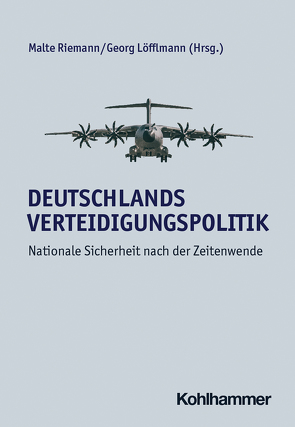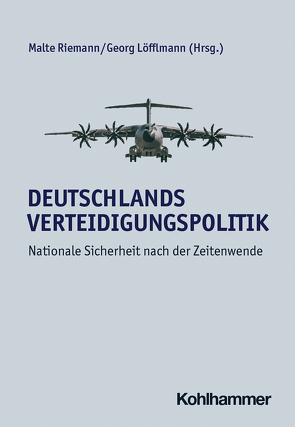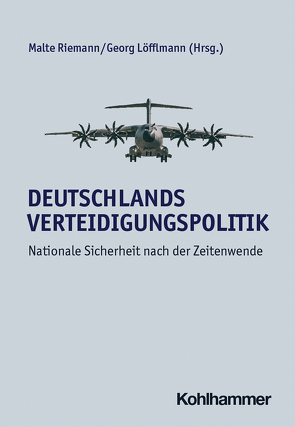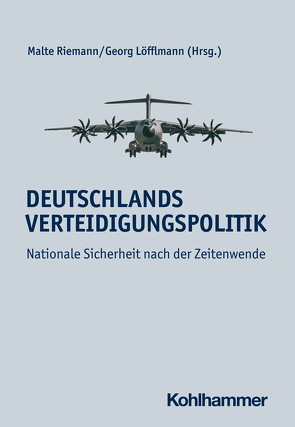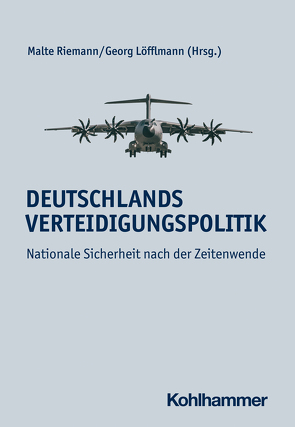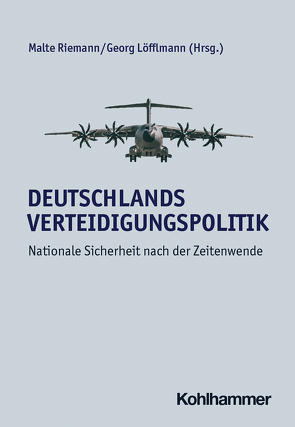Nach dem Angriffskrieg Russlands auf die Ukraine kündigte Bundeskanzler Olaf Scholz eine Zeitenwende in der deutschen Außen-, Sicherheits- und Verteidigungspolitik an. Ein epochaler Umbruch stellt Politik und Gesellschaft vor die Herausforderung, sich mit einer seit dem Ende des Kalten Krieges größtenteils vernachlässigten Thematik auseinanderzusetzen: der nationalen Sicherheit und der Verteidigung Deutschlands mit militärischen Mitteln.
Malte Riemann und Georg Löfflmann haben Beiträge verschiedener ExpertInnen versammelt. Die kompakte Einführung beleuchtet das Thema aus unterschiedlichen Perspektiven der Friedens-, Konflikt- und Sicherheitsforschung. Dabei werden konzeptionelle Ansätze vorgestellt, um die strategischen Herausforderungen für Deutschland und seine Rolle in Europa und der Welt einzuordnen und sichtbar zu machen.
Aktualisiert: 2023-06-30
> findR *
Nach dem Angriffskrieg Russlands auf die Ukraine kündigte Bundeskanzler Olaf Scholz eine Zeitenwende in der deutschen Außen-, Sicherheits- und Verteidigungspolitik an. Ein epochaler Umbruch stellt Politik und Gesellschaft vor die Herausforderung, sich mit einer seit dem Ende des Kalten Krieges größtenteils vernachlässigten Thematik auseinanderzusetzen: der nationalen Sicherheit und der Verteidigung Deutschlands mit militärischen Mitteln.
Malte Riemann und Georg Löfflmann haben Beiträge verschiedener ExpertInnen versammelt. Die kompakte Einführung beleuchtet das Thema aus unterschiedlichen Perspektiven der Friedens-, Konflikt- und Sicherheitsforschung. Dabei werden konzeptionelle Ansätze vorgestellt, um die strategischen Herausforderungen für Deutschland und seine Rolle in Europa und der Welt einzuordnen und sichtbar zu machen.
Aktualisiert: 2023-06-30
> findR *
Nach dem Angriffskrieg Russlands auf die Ukraine kündigte Bundeskanzler Olaf Scholz eine Zeitenwende in der deutschen Außen-, Sicherheits- und Verteidigungspolitik an. Ein epochaler Umbruch stellt Politik und Gesellschaft vor die Herausforderung, sich mit einer seit dem Ende des Kalten Krieges größtenteils vernachlässigten Thematik auseinanderzusetzen: der nationalen Sicherheit und der Verteidigung Deutschlands mit militärischen Mitteln.
Malte Riemann und Georg Löfflmann haben Beiträge verschiedener ExpertInnen versammelt. Die kompakte Einführung beleuchtet das Thema aus unterschiedlichen Perspektiven der Friedens-, Konflikt- und Sicherheitsforschung. Dabei werden konzeptionelle Ansätze vorgestellt, um die strategischen Herausforderungen für Deutschland und seine Rolle in Europa und der Welt einzuordnen und sichtbar zu machen.
Aktualisiert: 2023-06-30
> findR *
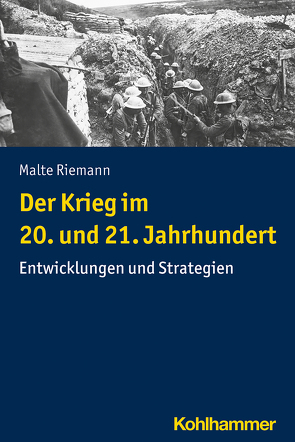
War is a chameleon, as the famous Prussian General Carl von Clausewitz remarked in the nineteenth century. And war can in fact take on different outward forms. Particularly during the last 120 years, the modes and strategies of war have changed several times & from people=s war and total war, through the Cold War, to ?humanitarian= and asymmetric war. All of these forms of war also make statements about the social, political and economic conditions in the states that wage them. Studying war is therefore not merely a specialized discipline in military history, but rather an integral component of a critical view of history.
Malte Riemann provides a concise introduction to the various forms of war and the way in which they have developed since the early twentieth century. He vividly discusses types of war, war technologies and military strategies. Beyond the narrow military field, the effects of war on societies and on the politics of the belligerent countries are also described. In the introduction, the author recounts debates in the history of ideas on the nature of war in modern times. This is followed by seven chronologically arranged chapters, initially considering the First World War (a people=s, positional and colonial war). This is followed by a description of the Second World War as a ?total= war. Subsequent chapters are devoted, among other matters, to the Cold War and the wars that followed the dissolution of the Soviet Union. In conclusion, the author provides a forward look towards potential scenarios for the future of war, based on current developments (the war on terror, asymmetric war, drone war, ?private war= conducted by mercenaries, and automated war).
The fact that the topic of war has never been off the political agenda since 1990, and that even in Germany we are by no means living in an age of perfect peace, is made particularly clear whenever the Bundestag has to decide yet again on the deployment of the Federal Armed Forces abroad. It is this topical relevance of the issue that has given the New Military History its impetus, attracting wide interest both from the general public and in the academic field.
Aktualisiert: 2023-06-30
> findR *
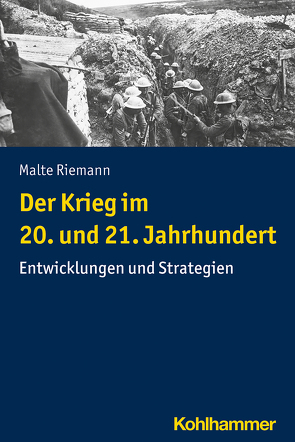
War is a chameleon, as the famous Prussian General Carl von Clausewitz remarked in the nineteenth century. And war can in fact take on different outward forms. Particularly during the last 120 years, the modes and strategies of war have changed several times & from people=s war and total war, through the Cold War, to ?humanitarian= and asymmetric war. All of these forms of war also make statements about the social, political and economic conditions in the states that wage them. Studying war is therefore not merely a specialized discipline in military history, but rather an integral component of a critical view of history.
Malte Riemann provides a concise introduction to the various forms of war and the way in which they have developed since the early twentieth century. He vividly discusses types of war, war technologies and military strategies. Beyond the narrow military field, the effects of war on societies and on the politics of the belligerent countries are also described. In the introduction, the author recounts debates in the history of ideas on the nature of war in modern times. This is followed by seven chronologically arranged chapters, initially considering the First World War (a people=s, positional and colonial war). This is followed by a description of the Second World War as a ?total= war. Subsequent chapters are devoted, among other matters, to the Cold War and the wars that followed the dissolution of the Soviet Union. In conclusion, the author provides a forward look towards potential scenarios for the future of war, based on current developments (the war on terror, asymmetric war, drone war, ?private war= conducted by mercenaries, and automated war).
The fact that the topic of war has never been off the political agenda since 1990, and that even in Germany we are by no means living in an age of perfect peace, is made particularly clear whenever the Bundestag has to decide yet again on the deployment of the Federal Armed Forces abroad. It is this topical relevance of the issue that has given the New Military History its impetus, attracting wide interest both from the general public and in the academic field.
Aktualisiert: 2023-06-30
> findR *
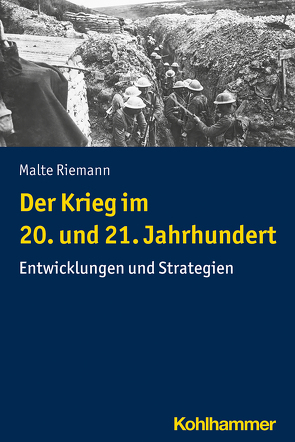
War is a chameleon, as the famous Prussian General Carl von Clausewitz remarked in the nineteenth century. And war can in fact take on different outward forms. Particularly during the last 120 years, the modes and strategies of war have changed several times & from people=s war and total war, through the Cold War, to ?humanitarian= and asymmetric war. All of these forms of war also make statements about the social, political and economic conditions in the states that wage them. Studying war is therefore not merely a specialized discipline in military history, but rather an integral component of a critical view of history.
Malte Riemann provides a concise introduction to the various forms of war and the way in which they have developed since the early twentieth century. He vividly discusses types of war, war technologies and military strategies. Beyond the narrow military field, the effects of war on societies and on the politics of the belligerent countries are also described. In the introduction, the author recounts debates in the history of ideas on the nature of war in modern times. This is followed by seven chronologically arranged chapters, initially considering the First World War (a people=s, positional and colonial war). This is followed by a description of the Second World War as a ?total= war. Subsequent chapters are devoted, among other matters, to the Cold War and the wars that followed the dissolution of the Soviet Union. In conclusion, the author provides a forward look towards potential scenarios for the future of war, based on current developments (the war on terror, asymmetric war, drone war, ?private war= conducted by mercenaries, and automated war).
The fact that the topic of war has never been off the political agenda since 1990, and that even in Germany we are by no means living in an age of perfect peace, is made particularly clear whenever the Bundestag has to decide yet again on the deployment of the Federal Armed Forces abroad. It is this topical relevance of the issue that has given the New Military History its impetus, attracting wide interest both from the general public and in the academic field.
Aktualisiert: 2023-06-30
> findR *
Nach dem Angriffskrieg Russlands auf die Ukraine kündigte Bundeskanzler Olaf Scholz eine Zeitenwende in der deutschen Außen-, Sicherheits- und Verteidigungspolitik an. Ein epochaler Umbruch stellt Politik und Gesellschaft vor die Herausforderung, sich mit einer seit dem Ende des Kalten Krieges größtenteils vernachlässigten Thematik auseinanderzusetzen: der nationalen Sicherheit und der Verteidigung Deutschlands mit militärischen Mitteln.
Malte Riemann und Georg Löfflmann haben Beiträge verschiedener ExpertInnen versammelt. Die kompakte Einführung beleuchtet das Thema aus unterschiedlichen Perspektiven der Friedens-, Konflikt- und Sicherheitsforschung. Dabei werden konzeptionelle Ansätze vorgestellt, um die strategischen Herausforderungen für Deutschland und seine Rolle in Europa und der Welt einzuordnen und sichtbar zu machen.
Aktualisiert: 2023-05-03
> findR *
Nach dem Angriffskrieg Russlands auf die Ukraine kündigte Bundeskanzler Olaf Scholz eine Zeitenwende in der deutschen Außen-, Sicherheits- und Verteidigungspolitik an. Ein epochaler Umbruch stellt Politik und Gesellschaft vor die Herausforderung, sich mit einer seit dem Ende des Kalten Krieges größtenteils vernachlässigten Thematik auseinanderzusetzen: der nationalen Sicherheit und der Verteidigung Deutschlands mit militärischen Mitteln.
Malte Riemann und Georg Löfflmann haben Beiträge verschiedener ExpertInnen versammelt. Die kompakte Einführung beleuchtet das Thema aus unterschiedlichen Perspektiven der Friedens-, Konflikt- und Sicherheitsforschung. Dabei werden konzeptionelle Ansätze vorgestellt, um die strategischen Herausforderungen für Deutschland und seine Rolle in Europa und der Welt einzuordnen und sichtbar zu machen.
Aktualisiert: 2023-05-03
> findR *
Nach dem Angriffskrieg Russlands auf die Ukraine kündigte Bundeskanzler Olaf Scholz eine Zeitenwende in der deutschen Außen-, Sicherheits- und Verteidigungspolitik an. Ein epochaler Umbruch stellt Politik und Gesellschaft vor die Herausforderung, sich mit einer seit dem Ende des Kalten Krieges größtenteils vernachlässigten Thematik auseinanderzusetzen: der nationalen Sicherheit und der Verteidigung Deutschlands mit militärischen Mitteln.
Malte Riemann und Georg Löfflmann haben Beiträge verschiedener ExpertInnen versammelt. Die kompakte Einführung beleuchtet das Thema aus unterschiedlichen Perspektiven der Friedens-, Konflikt- und Sicherheitsforschung. Dabei werden konzeptionelle Ansätze vorgestellt, um die strategischen Herausforderungen für Deutschland und seine Rolle in Europa und der Welt einzuordnen und sichtbar zu machen.
Aktualisiert: 2023-05-02
> findR *
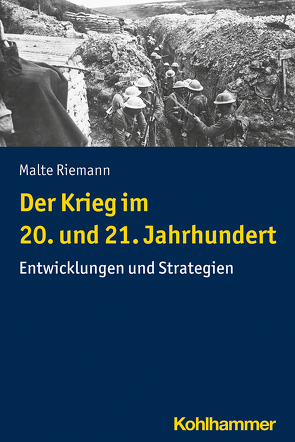
War is a chameleon, as the famous Prussian General Carl von Clausewitz remarked in the nineteenth century. And war can in fact take on different outward forms. Particularly during the last 120 years, the modes and strategies of war have changed several times & from people=s war and total war, through the Cold War, to ?humanitarian= and asymmetric war. All of these forms of war also make statements about the social, political and economic conditions in the states that wage them. Studying war is therefore not merely a specialized discipline in military history, but rather an integral component of a critical view of history.
Malte Riemann provides a concise introduction to the various forms of war and the way in which they have developed since the early twentieth century. He vividly discusses types of war, war technologies and military strategies. Beyond the narrow military field, the effects of war on societies and on the politics of the belligerent countries are also described. In the introduction, the author recounts debates in the history of ideas on the nature of war in modern times. This is followed by seven chronologically arranged chapters, initially considering the First World War (a people=s, positional and colonial war). This is followed by a description of the Second World War as a ?total= war. Subsequent chapters are devoted, among other matters, to the Cold War and the wars that followed the dissolution of the Soviet Union. In conclusion, the author provides a forward look towards potential scenarios for the future of war, based on current developments (the war on terror, asymmetric war, drone war, ?private war= conducted by mercenaries, and automated war).
The fact that the topic of war has never been off the political agenda since 1990, and that even in Germany we are by no means living in an age of perfect peace, is made particularly clear whenever the Bundestag has to decide yet again on the deployment of the Federal Armed Forces abroad. It is this topical relevance of the issue that has given the New Military History its impetus, attracting wide interest both from the general public and in the academic field.
Aktualisiert: 2023-05-03
> findR *
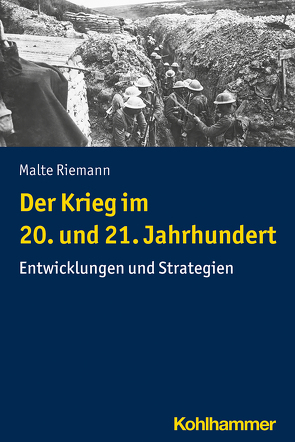
War is a chameleon, as the famous Prussian General Carl von Clausewitz remarked in the nineteenth century. And war can in fact take on different outward forms. Particularly during the last 120 years, the modes and strategies of war have changed several times & from people=s war and total war, through the Cold War, to ?humanitarian= and asymmetric war. All of these forms of war also make statements about the social, political and economic conditions in the states that wage them. Studying war is therefore not merely a specialized discipline in military history, but rather an integral component of a critical view of history.
Malte Riemann provides a concise introduction to the various forms of war and the way in which they have developed since the early twentieth century. He vividly discusses types of war, war technologies and military strategies. Beyond the narrow military field, the effects of war on societies and on the politics of the belligerent countries are also described. In the introduction, the author recounts debates in the history of ideas on the nature of war in modern times. This is followed by seven chronologically arranged chapters, initially considering the First World War (a people=s, positional and colonial war). This is followed by a description of the Second World War as a ?total= war. Subsequent chapters are devoted, among other matters, to the Cold War and the wars that followed the dissolution of the Soviet Union. In conclusion, the author provides a forward look towards potential scenarios for the future of war, based on current developments (the war on terror, asymmetric war, drone war, ?private war= conducted by mercenaries, and automated war).
The fact that the topic of war has never been off the political agenda since 1990, and that even in Germany we are by no means living in an age of perfect peace, is made particularly clear whenever the Bundestag has to decide yet again on the deployment of the Federal Armed Forces abroad. It is this topical relevance of the issue that has given the New Military History its impetus, attracting wide interest both from the general public and in the academic field.
Aktualisiert: 2023-05-03
> findR *
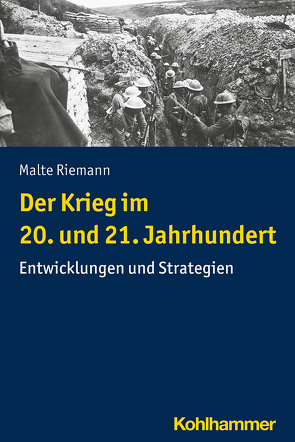
War is a chameleon, as the famous Prussian General Carl von Clausewitz remarked in the nineteenth century. And war can in fact take on different outward forms. Particularly during the last 120 years, the modes and strategies of war have changed several times & from people=s war and total war, through the Cold War, to ?humanitarian= and asymmetric war. All of these forms of war also make statements about the social, political and economic conditions in the states that wage them. Studying war is therefore not merely a specialized discipline in military history, but rather an integral component of a critical view of history.
Malte Riemann provides a concise introduction to the various forms of war and the way in which they have developed since the early twentieth century. He vividly discusses types of war, war technologies and military strategies. Beyond the narrow military field, the effects of war on societies and on the politics of the belligerent countries are also described. In the introduction, the author recounts debates in the history of ideas on the nature of war in modern times. This is followed by seven chronologically arranged chapters, initially considering the First World War (a people=s, positional and colonial war). This is followed by a description of the Second World War as a ?total= war. Subsequent chapters are devoted, among other matters, to the Cold War and the wars that followed the dissolution of the Soviet Union. In conclusion, the author provides a forward look towards potential scenarios for the future of war, based on current developments (the war on terror, asymmetric war, drone war, ?private war= conducted by mercenaries, and automated war).
The fact that the topic of war has never been off the political agenda since 1990, and that even in Germany we are by no means living in an age of perfect peace, is made particularly clear whenever the Bundestag has to decide yet again on the deployment of the Federal Armed Forces abroad. It is this topical relevance of the issue that has given the New Military History its impetus, attracting wide interest both from the general public and in the academic field.
Aktualisiert: 2023-05-03
> findR *
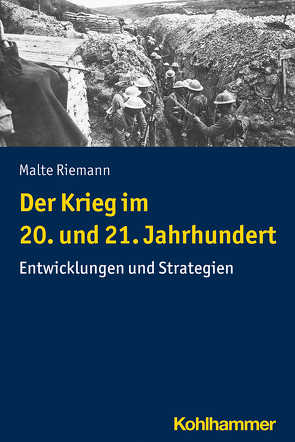
War is a chameleon, as the famous Prussian General Carl von Clausewitz remarked in the nineteenth century. And war can in fact take on different outward forms. Particularly during the last 120 years, the modes and strategies of war have changed several times & from people=s war and total war, through the Cold War, to ?humanitarian= and asymmetric war. All of these forms of war also make statements about the social, political and economic conditions in the states that wage them. Studying war is therefore not merely a specialized discipline in military history, but rather an integral component of a critical view of history.
Malte Riemann provides a concise introduction to the various forms of war and the way in which they have developed since the early twentieth century. He vividly discusses types of war, war technologies and military strategies. Beyond the narrow military field, the effects of war on societies and on the politics of the belligerent countries are also described. In the introduction, the author recounts debates in the history of ideas on the nature of war in modern times. This is followed by seven chronologically arranged chapters, initially considering the First World War (a people=s, positional and colonial war). This is followed by a description of the Second World War as a ?total= war. Subsequent chapters are devoted, among other matters, to the Cold War and the wars that followed the dissolution of the Soviet Union. In conclusion, the author provides a forward look towards potential scenarios for the future of war, based on current developments (the war on terror, asymmetric war, drone war, ?private war= conducted by mercenaries, and automated war).
The fact that the topic of war has never been off the political agenda since 1990, and that even in Germany we are by no means living in an age of perfect peace, is made particularly clear whenever the Bundestag has to decide yet again on the deployment of the Federal Armed Forces abroad. It is this topical relevance of the issue that has given the New Military History its impetus, attracting wide interest both from the general public and in the academic field.
Aktualisiert: 2023-04-04
> findR *
MEHR ANZEIGEN
Bücher von Riemann, Malte
Sie suchen ein Buch oder Publikation vonRiemann, Malte ? Bei Buch findr finden Sie alle Bücher Riemann, Malte.
Entdecken Sie neue Bücher oder Klassiker für Sie selbst oder zum Verschenken. Buch findr hat zahlreiche Bücher
von Riemann, Malte im Sortiment. Nehmen Sie sich Zeit zum Stöbern und finden Sie das passende Buch oder die
Publiketion für Ihr Lesevergnügen oder Ihr Interessensgebiet. Stöbern Sie durch unser Angebot und finden Sie aus
unserer großen Auswahl das Buch, das Ihnen zusagt. Bei Buch findr finden Sie Romane, Ratgeber, wissenschaftliche und
populärwissenschaftliche Bücher uvm. Bestellen Sie Ihr Buch zu Ihrem Thema einfach online und lassen Sie es sich
bequem nach Hause schicken. Wir wünschen Ihnen schöne und entspannte Lesemomente mit Ihrem Buch
von Riemann, Malte .
Riemann, Malte - Große Auswahl an Publikationen bei Buch findr
Bei uns finden Sie Bücher aller beliebter Autoren, Neuerscheinungen, Bestseller genauso wie alte Schätze. Bücher
von Riemann, Malte die Ihre Fantasie anregen und Bücher, die Sie weiterbilden und Ihnen wissenschaftliche Fakten
vermitteln. Ganz nach Ihrem Geschmack ist das passende Buch für Sie dabei. Finden Sie eine große Auswahl Bücher
verschiedenster Genres, Verlage, Schlagworte Genre bei Buchfindr:
Unser Repertoire umfasst Bücher von
- Riemasch-Becker, C.
- Riemeck, Renate
- Riemeier, Bernd
- Riemeier, Tanja
- Riemek, Bernd
- Riemek, Jennifer
- Riemel, Manfred Fred
- Riemelmoser, Angelika
- Riemelmoser, Gertrud
- Riemelmoser, Manuel
Sie haben viele Möglichkeiten bei Buch findr die passenden Bücher für Ihr Lesevergnügen zu entdecken. Nutzen Sie
unsere Suchfunktionen, um zu stöbern und für Sie interessante Bücher in den unterschiedlichen Genres und Kategorien
zu finden. Neben Büchern von Riemann, Malte und Büchern aus verschiedenen Kategorien finden Sie schnell und
einfach auch eine Auflistung thematisch passender Publikationen. Probieren Sie es aus, legen Sie jetzt los! Ihrem
Lesevergnügen steht nichts im Wege. Nutzen Sie die Vorteile Ihre Bücher online zu kaufen und bekommen Sie die
bestellten Bücher schnell und bequem zugestellt. Nehmen Sie sich die Zeit, online die Bücher Ihrer Wahl anzulesen,
Buchempfehlungen und Rezensionen zu studieren, Informationen zu Autoren zu lesen. Viel Spaß beim Lesen wünscht Ihnen
das Team von Buchfindr.
